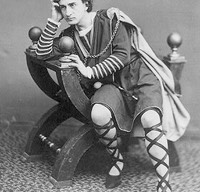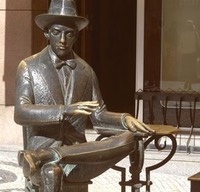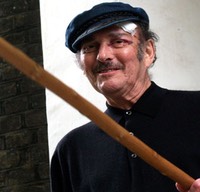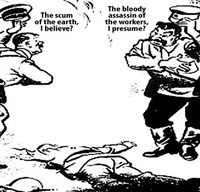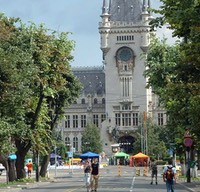Reportage
Three different faces
By Vivid writer: Christopher Lawson
Christopher Lawson reports on three different impressions of Romania from the British media
Posted: December 2005
In one single week at the end of September, the British press ran three Romania-related stories. One enshrined memories of the country’s rackety past, another reported on Roma teenagers in the UK, while the third was a feelgood account of a star student bound for Balliol. Taken together, they convey a certain image of the country.
Helen O’Brien, born Elena Constantinescu, fled the Russian cavalry on a racehorse in 1944 and was exiled in 1946 after the death of her first husband, an RAF officer, a month after marriage. She returned to the former family estates in1990, to be greeted by aged retainers.
Endowed, says her most substantial obituarist Veronica Horwell, with several languages, a showgirl’s figure and a head for figures, she owned and ran the Eve Club, just off Regent Street, for 39 years. With a strict ban on flash photography, Eve’s attracted kings, Arab princes, maharajahs, ambassadors, sultans, lords, erring clerics (including the Bishop of Southwell, who married a hostess), visiting showbiz stars, louche, philandering conservative politicians, business tycoons, high-end call girls, top rozzers from Scotland Yard, Eastern bloc diplomats and spies.
Membership cost a guinea a year. In the restrictive 1950s, Eve’s was beyond licensing laws. Champagne corks popped and bubbly flowed until 3 am. The dazzling floorshow reached international standards.
Beneath the glamour, the smell of sex, scandal and espionage hovered over the nightclub. But there was no sex on the premises. “We were not a whorehouse,” noted Helen. John Profumo, the cabinet minister undone by a sex scandal, held his stag night there, but Helen banned Christine Keeler, one of his undoers. “Too easily led,” she said. Norma Levy, author of the demise of Lord Lambton, lasted a few days. “Hard and mercenary, no breeding,” was Helen’s verdict. When she was negotiating with a Romanian secret agent for an exit visa for her parents, Helen, a fervent anticommunist, was recruited by M15 and M16.
Lord Jellicoe, leader of the Tories in the House of Lords, brought red government dispatch boxes to the club. Without photographers, Judy Garland, Frank Sinatra, Shirley Bassey, Barbara Cartland, Bond girl Eunice Gayson and Jack Hawkins felt secure at Eve’s. Errol Flynn mislaid his 12-year-old son, the future Vietnam war photographer Sean, and found him in the dressing rooms watching dancers.
Ari Onassis, “a hairy peasant without manners,” did not impress the proprietor. She threw out Nicu Ceausescu after he groped one hostess and bit another in the neck.
In the 1970s, Annabel’s, bursting with paparazzi, began to displace Eve’s. The end of the Cold War put paid to the spying. Floor shows with showgirls were passé.
Helen and husband Jimmy retired to a villa in the south of France, where Helen wrote her memoirs, The Queen of Clubs, in Romanian.
If we now turn from the glossy side of London society to those at the bottom of the pile, 500 young Romanian Roma have been identified as living in London. Because up to half do not attend school regularly, the Children’s Society has launched a film and guide to provide an insight into Roma behaviour and to dispel negative stereotypes.
Targeted at health workers, teachers, social workers and the police, the material is based on questionnaires sent to asylum teams, traveller education services, social services and schools. It answers the need for wide-ranging information about Roma culture and lifestyle, “to inform daily practice and future planning.” The co-author, Heather Ureche, conducted focus groups with health visitors. Half of them, with a substantial number of Roma clients, were at a loss to understand their charges.
In Roma society, teenagers are considered adults. To leave younger siblings with teenagers does not present a problem. Poor school attendance may be attributed to a nomadic way of life and the need to earn money. As patients they proved difficult and slow to adapt to new rules. They have poor time-keeping skills and no experience of appointment systems.
Many arrive in Britain, writes Alison Benjamin, with longstanding, untreated illnesses such as hepatitis B, digestive disorders and depression, coupled with stories of discrimination in Romanian public services. Corruption at hospitals was mentioned, as well as police beatings of men and women spat at in the street.
The report recommends that Roma children attend school from as early an age as possible, with literacy support tailored to their needs. At the same time, it stresses that work needs to be done with families to coax them into education and enable them to understand their rights and obligations.
Half of the young people who took part in That’s Who I Am have been sent back to Romania. Their asylum cases were turned down.
Truly, this is a hard field to hoe.
Far away from nightclubs and unruly teenagers is the heartening tale of 17-year-old Diana Ples from a high school in Arad. Diana’s mum is a carpenter, her dad an electrician. She benefitted from a partnership scheme run by Aquinas College, a Roman Catholic sixth-form college in Stockport. An essay on “Why I want to study abroad” led to her leap from modest family circumstances in western Transylvania to a place at Balliol College with an annual grant of GBP 20,000. She claims that her stunning command of English is due to a childhood addiction to Cartoon Network. “Dexter’s Laboratory and the Adams Family weren’t subtitled, but after a while we started figuring them out.”
She scored five grade As at A Level, in English Literature, Maths, History, Chemistry and General Studies, and AS Levels in Philosophy, Mechanics and Psychology, all top grade. After a mere two years in the UK, she scored 300 out of 300 in English literature, “my biggest passion” says Diana. The examiners decided she had not dropped a mark in philosophy. “The philosophy staff at Aquinas were reduced to writing just one word, ‘awesome,’ at the end of her essays,” said principal Ambrose Smith. During her time in Stockport she lived with the principal and his family.
The general warmth and friendliness she experienced in the northwest of England over the past two years surprised her, she confesses. “The East European view of the English was that they were cold, snobbish people. But I have found they are awfully nice. In Romania, it’s a much tougher environment. You have to be tougher.”
What will be the end of this heartening story? I suspect a glittering career as a philosophy academic awaits Diana at Oxford, and wonder if she will ever return to Romania for good. No matter. If only all stories about Romania were so positive.
